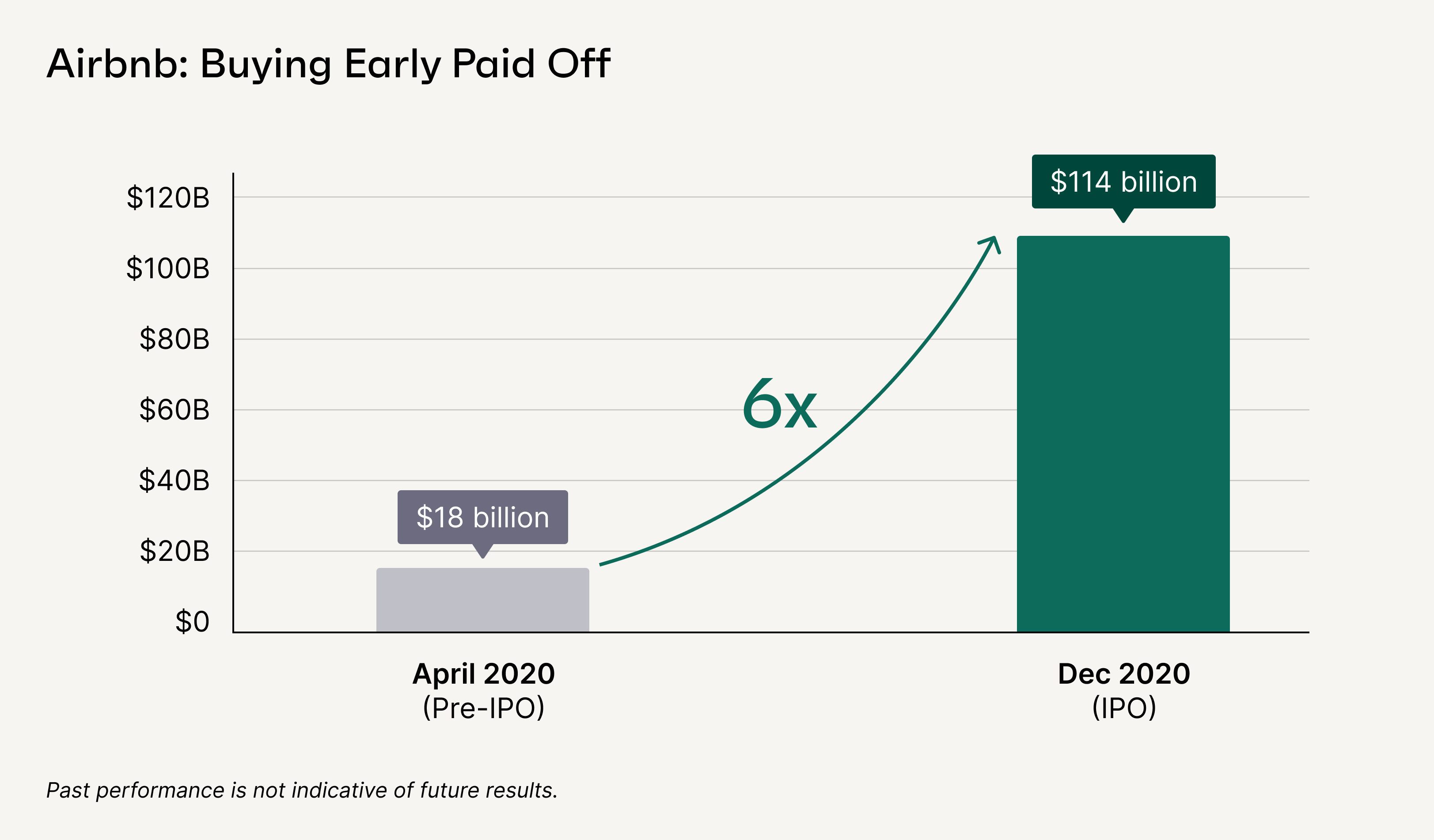By the time you can buy a share on the public market, you may be too late – in some cases, the wealth creation is already gone.
If you bought Airbnb on the first day of its IPO, you did well, but some early backers did 10 times better. The company was worth $18 billion in April 2020 and went public on Nasdaq eight months later at a valuation of $114 billion. A 6x jump that happened entirely in private markets. Past performance is not indicative of future results.

This isn't unique to Airbnb. Companies like Stripe, SpaceX, and Anthropic are worth hundreds of billions, but you can't buy them on any exchange.
Today, the velvet ropes that kept regular investors on the sidelines for decades are finally coming down. For investors, the question becomes how do you identify and access the most promising opportunities?
What exactly are pre-IPO deals?
Pre-IPO investing means buying shares in private companies before they go public. Unlike buying Apple or Tesla on exchanges at transparent prices, pre-IPO deals involve buying directly from companies or shareholders through private negotiations at internally-set valuations.
These shares are typically offered to early investors, advisors, and employees in several forms:
- Late-Stage Venture Rounds: Companies raising $50M-$500M+ rounds, typically 1-3 years before IPO.
- Secondary Market Transactions: Direct purchases from existing shareholders, typically 6-18 months before going public.
- Growth Equity: Investments in profitable companies considering IPO within 2-5 years.
The defining characteristic is illiquidity—your money is locked up 3-7 years and does not come with a guaranteed exit. Unlike public stocks where you can sell instantly, pre-IPO investors are committed for the long haul.
But this is where notable value creation happens...
Pre-IPO Investing: Where significant value creation is happening
Early-stage value creation often occurs in private markets before companies go public. A comprehensive analysis revealed pre-IPO returns beat post-IPO returns by a wide margin, while buying IPOs has consistently produced lower returns.
This value creation is increasingly concentrated in fewer hands. While 2021 saw over 1,000 IPOs, 2024 managed only 218—a 78% decline. Companies now stay private for 12 years versus the historical 4-6 years, meaning more wealth accumulates behind closed doors.
What makes pre-IPO shares so compelling is their DNA:
- Discounted Returns: Pre-IPO shares are priced at significant discounts to public valuations.
- Limited Supply: Scarcity and exclusivity drive demand.
- Brand Equity: Access to Stripe, SpaceX, and Anthropic before they hit public markets.
- Less Volatility: Private valuations aren't subject to market mood swings.
- Getting Ahead: Profit before Wall Street gets access.
This isn't theoretical wealth—it's happening now. With over 1,200 unicorns currently in the pipeline, billions in value are being created daily in private markets for those who can get in.
The velvet rope: Who can actually access pre-IPO deals
Pre-IPO investing remains largely exclusive. The SEC's accredited investor requirements demand either $200,000+ annual income, $1+ million net worth (excluding primary residence), or professional licenses. Traditional access requires serious wealth—venture capital funds have $1-10 million minimums, private equity funds start at $1-25 million.
While platforms now offer lower minimums, with these come new considerations. Many offer extensive deal flow but with limited curation, requiring investors to evaluate opportunities independently. Even when you find good opportunities, most platforms focus primarily on deal access rather than tax optimization strategies or retirement account integration—leaving money on the table.
This is where Alto's marketplace creates a unique advantage. Rather than overwhelming investors, Alto's team curates and vets opportunities across venture capital, private equity, and emerging companies. Each deal undergoes thorough due diligence examining management quality, financial performance, and exit probability.
More importantly, Alto handles the compliance and administrative aspects of holding these alternative investments in tax-advantaged retirement accounts—something traditional brokerages don’t typically do.
The result is institutional-quality pre-IPO deals with Alto IRA tax advantages, without drowning in paperwork.
The Self Directed IRA wrapper: Tax-free wealth building
Pre-IPO investments inside a self-directed IRA can be tax-free (Roth) or tax-deferred (Traditional).
A 10x return on $50,000 in a taxable account means $67,500-$90,000 to the IRS. In a Roth IRA? Zero taxes.*
Peter Thiel proved this strategy. He grew his Roth IRA from $2,000 to over $5 billion, tax-free. He bought 1.7 million PayPal shares at $0.001 each ($1,700 total), then reinvested the $55 million windfall into Facebook—all within his tax-advantaged account.
Tax-free compounding means no capital gains taxes eating returns. Thiel held Facebook, Airbnb, Palantir, and SpaceX, buying and selling without tax consequences. Pre-IPO's 3-7 year holding periods align with retirement timelines. Contributions cap at $7,000 annually, but growth is unlimited.
This isn't just for billionaires. Private equity employees investing $25,000 in IRAs saw returns exceed $23 million—over 1,000x returns, tax-free.
The caveat is following strict IRS rules and accredited investor status for top deals. But the self-directed IRA wrapper means keeping every penny versus paying 20-37% in taxes.
The brutal reality check: Failure rates and hidden risks
Behind every celebrated pre-IPO success lie dozens of failures. The statistics are sobering: 90% of startups fail, with 70% failing within years 2-5. Q1 2024 saw a 58% increase in startup failures, with 254 venture-backed businesses shutting down—the highest failure rate in a decade.
The culprits are predictable: 42% fail due to misreading market demand, 29% run out of funding, and 23% suffer from weak founding teams. For every unicorn creating generational wealth, hundreds result in partial or total losses.
But there's another uncomfortable question: if these companies are amazing investments, why are employees and early investors selling shares to outsiders?
When you buy pre-IPO shares, you're buying from employees seeking diversification, early investors taking profits, or people needing liquidity who can't wait for an IPO.
There are two ways to interpret this:
- The optimistic view: This creates genuine access for external investors—employees need diversification, early investors want returns after 5-7 years, and traditional portfolio management creates opportunities for those previously locked out.
- The pessimistic view: Insiders have massive information advantages. They see real financial performance, customer churn, competitive threats, management conflicts, and missed targets that external investors never see. They might doubt the company will go public.
How do you tell the difference?
Watch for red flags like high insider selling volumes, executives selling significant portions, multiple waves of selling, or selling coinciding with missed milestones. Positive signals include limited selling for life events, company-organized liquidity programs, insiders retaining most holdings, or strong recent fundraising.
The key insight is, don't ask "Can I buy?" Ask "Why is someone selling?"
The bottom line: Making your first Pre-IPO Investments
Pre-IPO investing embodies the classic high-risk, high-reward proposition. The potential for 100x+ returns is real, but so is the 90% failure rate that can eliminate entire investments.
The new access represents genuine progress, but investors must understand they're entering a market where institutional players still command the best deals. Success requires treating pre-IPO investing as a small portion of a diversified portfolio, never risking money you cannot afford to lose entirely.
For most investors, the smart play might be patience.
But for accredited investors ready to navigate this landscape, platforms like Alto's curated marketplace offer a compelling solution: vetted alternative investments, tax optimization through self-directed IRAs, and professional due diligence individual investors can't replicate.
The pre-IPO market offers compelling opportunities—but requires thorough consideration of all factors involved.
Ready to learn more? Download Alto's white paper on pre-IPO investing to dive deeper into strategies, risk assessment, and tax optimization techniques for investors.
*Note: While Roth IRAs are designed to provide tax-free growth and withdrawals, certain conditions must be met to avoid taxes or penalties. Earnings may be subject to income tax and a 10% early withdrawal penalty if the account has not been open for at least five years or if distributions are taken before age 59½, unless an exception applies.Please consult a tax advisor for guidance specific to your situation. This information is provided for general educational purposes and should not be construed as tax or legal advice.





